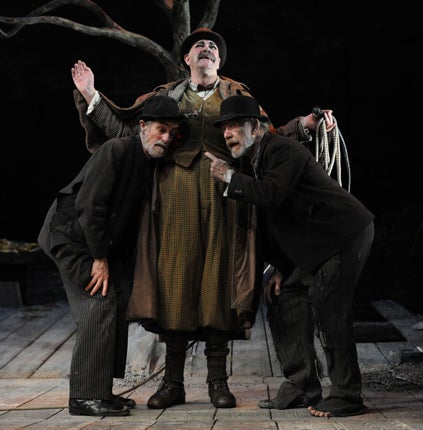Waiting for Godot, Haymarket Theatre, London
These jokers are no super tramps

Your support helps us to tell the story
From reproductive rights to climate change to Big Tech, The Independent is on the ground when the story is developing. Whether it's investigating the financials of Elon Musk's pro-Trump PAC or producing our latest documentary, 'The A Word', which shines a light on the American women fighting for reproductive rights, we know how important it is to parse out the facts from the messaging.
At such a critical moment in US history, we need reporters on the ground. Your donation allows us to keep sending journalists to speak to both sides of the story.
The Independent is trusted by Americans across the entire political spectrum. And unlike many other quality news outlets, we choose not to lock Americans out of our reporting and analysis with paywalls. We believe quality journalism should be available to everyone, paid for by those who can afford it.
Your support makes all the difference.The nation whose most characteristic words include "home" and "cosy" have always been good at domestication, as Shaw found in his transformation from firebrand to licensed fool.
Hard to believe, as one hears the roars of laughter that have for some time routinely greeted this play, often cast with comedians (though it requires clowns), that it was at first met not just with perplexity but with hatred.
The mink-clad theatregoers of Miami, the surreal location of Waiting for Godot's American premiere, in 1956, stalked out en masse at the interval, and the cast and Beckett were vilified in the press. An aggrieved fan denounced Bert Lahr, its Estragon, for appearing in a play that was "communistic, atheistic, and existentialist". (He asked, "What's existentialist'?") Nor was it only philistines who damned this vision of tramps in purgatory. My drama professor at university told us that Godot was, like The Birth of a Nation, an evil masterpiece. But Godot now, instead of a warning or lament, is a hoot, the music-hall and Marx Brothers routines that Beckett transformed returned to their original purpose. It is worth remembering that Lahr knew he could make his audience laugh; he wanted to make them cry, and he did.
Sean Mathias's production, in which Patrick Stewart last year took the role of Vladimir, the more thoughtful of the two tramps, had a tendency toward excess gaiety. With the substitution of Roger Rees, that has been fatally emphasised, with the winsome and fidgety Rees at times reminiscent of Richard Briers, or even Dick van Dyke. His looks are far too young, his manner too tentative for 50 years of comradeship with Ian McKellen's Estragon, and his ingratiating flourishes succeed all too well in shooing away the blues.
Though the play has lost gravitas in Rees, it has gained it (to a far lesser degree, of course) in Matthew Kelly's Pozzo. Instead of Simon Callow's manic ringmaster, Kelly, in checked plus fours, is an ominous Edwardian sportsman. The shaven head and large moustache give him the look of a circus strongman trying a bit too hard to fit in, hence the wicked mockery in McKellen's imitation of him, emphasising his dropped final "g"s. But this bully is also a huge, pathetic baby – the simple-minded delight he radiates in his power over the enslaved Lucky (Ronald Pickup again, his suppressed hatred and panic more incisive than last year) is countered by his terrified-infant's howl when crawling and blind.
McKellen continues to inhabit his role with conviction, the mood of banter and resignation suddenly changed by the head that swivels as if pulled by a string, the eyes beneath the bowler looking out for something they don't want to see. But his performance, also, is too gas-and-gaiters, his triumphant, grinning put-down of his friend with the insult "Critic!" far less devastating than regretful hauteur would be. It is also not as funny. The belly laughs in Beckett are dragged from a void in which Estragon fails to see he is only a bare, forked version of the radish he disdains. The light and knowing laughs in the Haymarket are saying, oh yeah, it's that life-is-meaningless thing, ha-ha-ha.
To 3 April (0845 481 1870)
Join our commenting forum
Join thought-provoking conversations, follow other Independent readers and see their replies
Comments